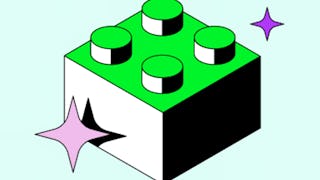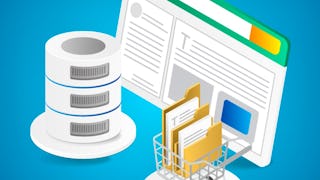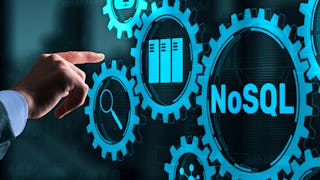This course will teach you how to perform data analysis using MongoDB's powerful Aggregation Framework.



(63 reviews)
Skills you'll gain
Details to know

Add to your LinkedIn profile
36 assignments
See how employees at top companies are mastering in-demand skills

There are 3 modules in this course
In this module you'll learn the fundamentals of MongoDB's Aggregation Framework. This will cover basics like filtering and sorting, as well as how to transform array data, how to group documents together, how to join data, and how to traverse graph data.
What's included
15 videos1 reading15 assignments
This module is going to be focused on the different ways you can leverage MongoDB's flexible schema. You'll learn how to migrate a relational schema, how to enhance existing schemas, and how to merge datasets via an entity resolution technique.
What's included
11 videos9 assignments
This module is focused on demonstrating how MongoDB can be used in different machine learning workflows. You'll learn how to perform machine learning directly in MongoDB, how to prepare data for machine learning with MongoDB, and how to analyze data with MongoDB in preparation of doing machine learning in Python.
What's included
11 videos12 assignments
Earn a career certificate
Add this credential to your LinkedIn profile, resume, or CV. Share it on social media and in your performance review.
Instructors

Offered by
Explore more from Data Analysis


MongoDB Inc.


Edureka
 Status: Free Trial
Status: Free Trial Status: Free Trial
Status: Free Trial
Why people choose Coursera for their career




Learner reviews
63 reviews
- 5 stars
58.73%
- 4 stars
33.33%
- 3 stars
6.34%
- 2 stars
1.58%
- 1 star
0%
Showing 3 of 63
Reviewed on Sep 9, 2019
Very clear introduction to the MongoDB Aggregation Framework. Interesting and comprehensive data analysis examples as well!
Reviewed on Jul 12, 2019
The course was excellent, but there were some problems: - There were mistakes in some assignments codes. - Some codes mentioned in the lectures were not available in resources.
Reviewed on Oct 21, 2020
Great course! It covers the essential and advanced uses of MongoDB. I highly recommend it.
New to Data Analysis? Start here.

Open new doors with Coursera Plus
Unlimited access to 10,000+ world-class courses, hands-on projects, and job-ready certificate programs - all included in your subscription
Advance your career with an online degree
Earn a degree from world-class universities - 100% online
Join over 3,400 global companies that choose Coursera for Business
Upskill your employees to excel in the digital economy
Frequently asked questions
Access to lectures and assignments depends on your type of enrollment. If you take a course in audit mode, you will be able to see most course materials for free. To access graded assignments and to earn a Certificate, you will need to purchase the Certificate experience, during or after your audit. If you don't see the audit option:
The course may not offer an audit option. You can try a Free Trial instead, or apply for Financial Aid.
The course may offer 'Full Course, No Certificate' instead. This option lets you see all course materials, submit required assessments, and get a final grade. This also means that you will not be able to purchase a Certificate experience.
When you enroll in the course, you get access to all of the courses in the Specialization, and you earn a certificate when you complete the work. Your electronic Certificate will be added to your Accomplishments page - from there, you can print your Certificate or add it to your LinkedIn profile. If you only want to read and view the course content, you can audit the course for free.
If you subscribed, you get a 7-day free trial during which you can cancel at no penalty. After that, we don’t give refunds, but you can cancel your subscription at any time. See our full refund policy.
More questions
Financial aid available,





